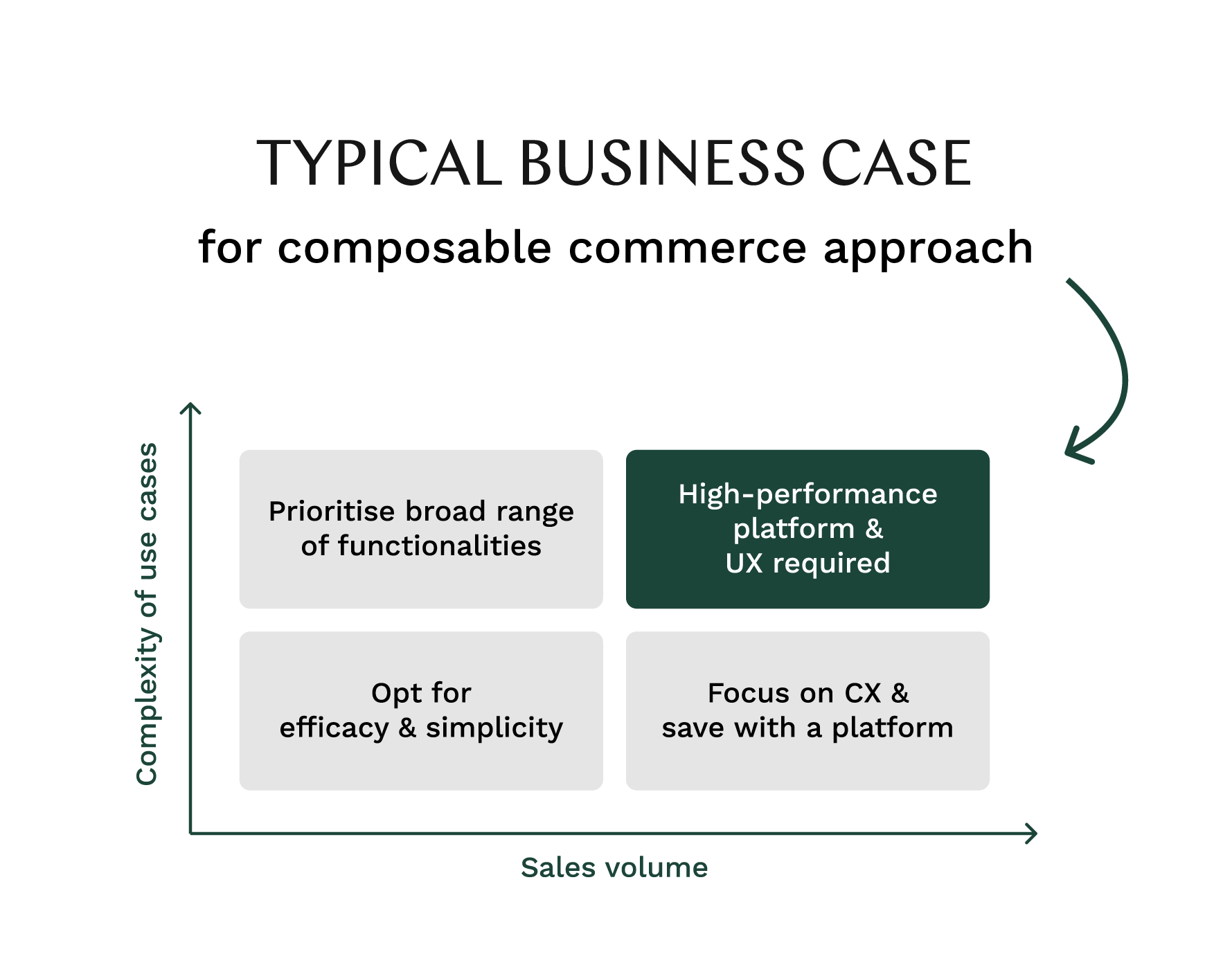Future-proof your ecommerce
Learn more about how we can help you with composable commerce
Explore composable commerceComposable commerce has taken over digital sales, promising to be a future-proof approach to ecommerce. In our previous blog, we defined the core benefits of the approach and how it compares to other approaches, such as monolithic ecommerce platforms. Promising flexibility, scalability and efficacy, composable commerce can seem like the obvious approach for future digital sales. Still, it's not a one-size-fits-all solution. In this blog, we share four cases when composable commerce can be the right fit for your company.
Four reasons to consider composable commerce
1. Scaling existing IT architecture
Taking the composable commerce approach to digital sales has benefits, especially for companies that have an existing digital commerce architecture in place. If you have an existing infrastructure set up, you can venture into composable commerce step-by-step without risking your business with big-bang changes.
For companies that are already established in ecommerce, composable commerce allows them to bring in new components to the infrastructure without having to replace already existing systems altogether. Consequently, scaling the business is much more efficient and flexible. Just keep on building on top of what you've already built.
For example, your existing PIM can be replaced with a new and improved one without affecting other parts of the IT infrastructure. Similarly, if CMS needs updating, it can be done flexibly without having to rethink the entire architecture. With composable commerce, your ecommerce grows as you grow.
2. Complex business models
Complexity in business models indicates that composable commerce might be the right approach for your company. If your business model or operating environment doesn't fit the conventional boxes, chances are that your ecommerce benefits from increased flexibility and customisability.
This is often the case for B2B companies, where the sales process is more multifaceted than in B2C. Composable commerce is equipped to handle complex processes to provide B2B buyers with a smooth experience.
While some typical B2B needs, like customer-specific pricing, can be covered with most monolithic solutions, certain requirements are handled better with the composable commerce approach. For instance, your customers might have complex purchase approval processes. You could also use the configure-price-quote (CPQ) process to ensure the best prices for your customers. Or there might be advanced customisation options for your products depending on the customer. Composable commerce allows for the flexibility needed to build digital sales that support these processes.
Your business model can also place heavy demands on the storefront. If differentiation and personalisation are high up on your list of priorities, having a separate storefront built with a modern tech stack can increase flexibility and speed up introducing enhancements and new features.
3. Large companies
Monoliths are quite easy to set up and manage. One system is equipped to handle your products, customers, content and so on. Composable commerce on the other hand requires more digital maturity, time, and resources to build and orchestrate.
Large companies with the required organisational capabilities often also have more requirements for their ecommerce, making composable commerce the right fit for them. For instance, composable commerce allows building multiple web shops for multiple brands in multiple markets efficiently using the same functionalities in the back end. In addition, the modular approach supports large companies that operate in different fields. Modularity also means that separate functions can be managed by different people or teams.
To paint a picture of a larger company that benefits from the composable commerce approach, think, for example, of a large-scale retailer. A wide range of products might pose unique requirements for the search function. With the best-of-breed principle, it can choose microservices that are sturdy enough to handle the business.
4. Omnichannel commerce
Your customers could discover you from anywhere offline, on the web, and on social media, among other channels. The relevance of omnichannel sales is only growing. For instance, Target reports that their omnichannel guests spend four times as much as stores-only guests and even more compared to digital-only guests. An omnichannel-capable composable commerce solution helps you reach your customers wherever they might be.
Composable commerce allows for seamless implementation across different devices and touchpoints. Sales channels can be found in the most creative places, from Apple Watches to Audi's cars' multimedia systems. Composable commerce is equipped to support these ambitious omnichannel strategies and provides a platform on top of which it's possible to add new sales channels and other customer interfaces quickly.
In summary, composable commerce is the approach when your plans for ecommerce are ambitious. Whether you are looking to scale your existing IT infrastructure, navigate complex business models, meet the needs of a large company, or enter a new market, composable commerce can provide the flexibility, scalability, and customisation you need to succeed. While implementing this approach may require more digital maturity and resources upfront, the long-term benefits can make it well worth the investment.
The composable commerce guide
What is composable commerce, who is it relevant to and what platforms enable the approach? Discover composable commerce with this guide.
Download





